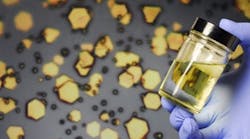The reign of aqua regia for dissolving noble metals such as gold and palladium may be nearing an end, believe researchers at the Georgia Institute of Technology, Atlanta. They have developed an organic solvent that provides high dissolution rates at room temperature as well as environmental benefits. It promises to simplify recovery of these valuable metals in spent catalysts, residues in semiconductors and elsewhere in electronics manufacturing, as well as fuel cells and batteries, they say.
"…This is the first time that dissolution of noble metals has been essentially reached in organic systems…," notes C. P. Wong, a professor in the School of Material Science and Engineering.
The solvent, which they dub organic aqua regia, contains two chemicals — thionyl chloride and an organic reagent such as pyridine, N-dimethylformamide or imidazole. Tailoring its composition allows selective dissolution of gold or palladium, which then can be recovered by calcination. It will not dissolve platinum. So, use of the solvent can avoid other-noble-metal impurities in reclaimed material.
The researchers already have selectively dissolved gold and palladium from a mixture containing those metals and platinum, and gold from a mixture of gold and palladium.
"We need to be able to selectively dissolve these noble metals to ensure their purity in a variety of important applications," says Wong. "Though we don't fully understand how it works yet, we believe this system opens a lot of new possibilities for using these metals."
"We hope this will open up some new ways of making … important pharmaceutical compounds [chemotherapy agents] as well as novel gold and palladium catalytic systems."
"We are now working on selective dissolution of nanoparticles of noble metals and trying to demonstrate directly that catalyst wastes from automobiles' fuel cells and lithium batteries can be recycled in this way."
The organic solutions are more expensive than aqua regia or currently used leaching agents such as cyanide — but are recyclable and don't produce highly toxic wastes like the leachants, notes Wong. The organic solutions provide slower dissolution rates than aqua regia but are safer to work with; they are faster than commercial aqueous leaching agents, he adds.
"…I believe optimizations of various applications of the organic aqua regia will be feasible, and more potential applications that we might not have though about [may] pop up," says Wong.
